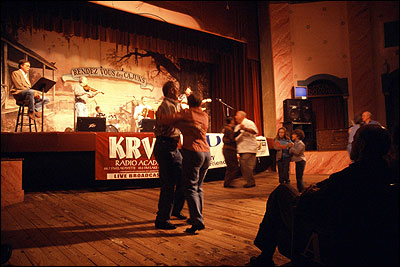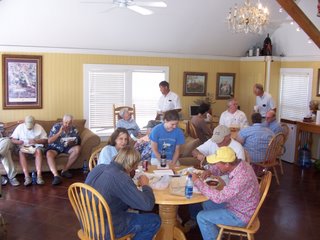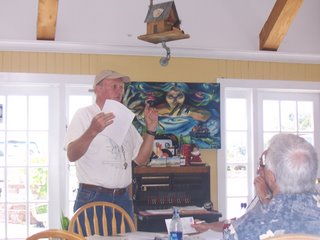Today, the Boston Globe, in its travel section, posted an article by Rod Clarke entitled "
Cajun rejuvenation on a Louisiana 'prairie'". In his article, Rod writes of his March visit to the Cajun Prairie, more particularly Eunice and Mamou, Louisiana. Many thanks to Rod for his article about my beloved home, our nouveau Acadie. My only concern about the article is the quoted comment when inquiring about my secret ingredient to a good crawfish etouffee -- "Beer," Lance Pitre, owner of the L'Acadie Inn in Eunice, said when asked about his ingredients. "And that's for the cook.". I would hate for the general audience to this Blog to get the idea that the statement above goes along with the rest of the six pack on a nightly basis. 'Chere, that's only for occasional socials --- when's the next one?' Below, I have reprinted a copy of the article published in the Boston Globe on May 14, 2006 for those who have trouble with the link above:
(Robert Cross / Chicago Tribune via KRT)
Cajun rejuvenation on a Louisiana 'prairie'
Boston Globe 
Cajun rejuvenation on a Louisiana 'prairie'
By Rod Clarke, Globe Correspondent May 14, 2006
 EUNICE, La. -- Here in Cajun Country, it's all about the music. It beckons from each doorway, lures you down each dusty road. It's not the soulful sound of Delta blues, nor the thumping backbeat of Nawlins jazz. Here amid the crawfish ponds and rice fields of southwestern Louisiana, it's the fiddle and the accordion -- the lilting language of Acadiana -- that rule.
EUNICE, La. -- Here in Cajun Country, it's all about the music. It beckons from each doorway, lures you down each dusty road. It's not the soulful sound of Delta blues, nor the thumping backbeat of Nawlins jazz. Here amid the crawfish ponds and rice fields of southwestern Louisiana, it's the fiddle and the accordion -- the lilting language of Acadiana -- that rule.
On the other hand, it could be all about the food. Order crawfish étouffée in, say, Detroit, and you probably will get a blank stare. Here, they have two étouffée festivals a week apart within 20 miles of each other.
It will be a while before New Orleans recovers from Hurricane Katrina's visit, so for a different taste of Louisiana, keep going west past the Big Easy, past Baton Rouge, and head up into the Cajun prairie country of Saint Landry and Evangeline parishes.
Then "laissez les bon temps rouler" -- let the good times roll.
Instead of the bayous many associate with Cajun culture, here you find lush grasslands suited for farming and grazing. Eunice calls itself "Louisiana's Prairie Cajun Capital."
The word Cajun comes from the French who in 1604 settled what is now Nova Scotia and some of whom went on to settle in New Brunswick. They called it Acadia and were known as Acadians, then Cajuns. In 1713, the French sold Nova Scotia to England. Between 1755-63, the British rounded up and deported some 14,000 to 18,000 Acadians. Some were sent to England as prisoners of war; some to northern France; most to the American colonies, many eventually reaching Louisiana. Thousands died.
But the Cajuns' recent darkest days may have come in the last century when the United States almost did what the British could not: take away their culture.
"That was back when they wanted to make all of America into McDonalds," said Vincent Fontenot, a ranger assigned to the Prairie Acadian Cultural Center in Eunice, part of the Jean Lafitte National Historical Park and Preserve.
"Every time we spoke a word in French, the teacher would bend our fingers over backward," said Dorothy Pitre, a hostess at the Cajun Music Hall of Fame and Museum. "I didn't know what I was being punished for."
Many Cajuns Anglicized their names, stopped speaking French at home, and insisted their children speak English.
The culture appeared on the brink of extinction until the 1960s, when America discovered Acadiana. Cajun music was the rage. Cajun food swept the land. Louisiana passed a law promoting preservation of the French language.
Today, that cultural resurgence manifests itself in a strong sense of pride among prairie Cajuns, who welcome the opportunity to share with visitors their food, music, and lifestyle.
"We love it when the people come through here to visit and enjoy our Cajun food and music and hospitality, and we learn to love them, too," Pitre said. "Hospitality is something we're brought up with."
To the casual listener, Cajun music is joyous, toe-tapping, upbeat. But since it's almost always sung in French, non-Cajun listeners don't always hear the underlying message, one that reflects Cajun history. Between the lines, you hear lyrics that speak of sorrow and lost love and pain.
"It's happy music, you can jump to the two-step," Pitre said. "But it's got sadness, too."
North of Eunice, Mamou, the self-proclaimed "Cajun Music Capital of the World," is home to Fred's Lounge, an international magnet for Cajun music lovers.
Fred's opens Saturday mornings at 8 and closes at 1:30 p.m. The rest of the week, the doors are locked. But for those 5 1/2 hours, it rocks. And its heart, soul, and firecracker spirit is "Tante Sue de Mamou" (Aunt Sue of Mamou), the soft-spoken, white-haired grandmother who pours complimentary shots of "Hot Damn" -- spicy cinnamon-flavored schnapps -- from a bottle she carries in a holster tied down like a six-gun on her thigh.
Sue Vasseur, 74, the widow of Fred Tate, who bought the place in 1946, took over when he died in 1992, then sold Fred's five years later, staying on as general manager.
"Now I have all the fun, but none of the worries," Vasseur said.
All the bar seats are filled by 8:30, the Howard Noel, Jr., Cajun Boogie Band starts playing at 9, when a local radio station begins broadcasting -- just as it has since 1962. By 10 a.m., you're lucky to squeeze in the door.
Back in Eunice, the Liberty Center for the Performing Arts is to Cajun music what the Grand Ole Opry is to country. Each Saturday evening, this restored 1924 movie house hosts a live Cajun music TV and a radio broadcast.
Next door, the Prairie Acadian Culture Center features artifacts, exhibits, and live demonstrations of the prairie Cajun heritage and -- surprise! -- music and food workshops. It is hard to separate the two in Cajun Country. "They're intertwined," Pitre said.
It might be possible to eat without music, but hardly anyone around here does. By 6 p.m. on a Friday, dozens are lined up at D.I.'s, a hard-to find-restaurant ("just drive till you think you've gone too far, and there it is") in neighboring Basile, sucking on longnecks and waiting to feast on boiled crawfish from D.I.'s ponds. On the dance floor, an octogenarian two-steps with a 9-year-old.
Owner Sherry Fruge said D.I.'s goes through 3,000 to 5,000 pounds of crawfish a week.
That marriage of food and music peaked at Eunice's 21st Annual World Championship Crawfish Étouffée Cook-off held on the last Sunday in March.
Étouffée (pronounced EH-too-FAY) is basically a savory blend of crawfish, simmered in butter with the staples of Cajun cooking: bell peppers, celery, green onions, garlic, and spices.
But the devil is in the details, and the competing cooks guard their recipes with pitbull tenacity.
"Beer," Lance Pitre, owner of the L'Acadie Inn in Eunice, said when asked about his ingredients. "And that's for the cook."
Three bands provided music as about 30 competitors -- restaurants, political candidates, radio stations, local businesses -- cooked away. The team from Ardoin's Funeral Home, "Cajun Undertakers," sported T-shirts boasting, "We put the competition to rest cher!"
Mayor Lynn Lejeune, selling event T-shirts, estimated the turnout at about 2,500. Included were many of the visitors seen earlier at Fred's Lounge and the Prairie Acadian Cultural Center, drawn by the food and the music.
After going away to college and living in Baton Rouge for seven years, Lance and Kelly Pitre moved back to Eunice to be closer to their families.
Stirring his étouffée, he described how they tried in vain to have a French program established in the local schools so that their four children (with a fifth due in July) could learn the language of their ancestors.
"We wanted to have some French in their education," Pitre said.
Rebuffed, the Pitres opted to home-school their children, underscoring his return to his roots.
"I realized that if I wanted to know where I was going, I needed to know where I came from," he said. ____________________________________________
If you go: Louisiana
By Rod Clarke, Globe Correspondent May 14, 2006
How to get there
Eunice is 174 miles northwest of New Orleans, taking Interstate 10 west to Interstate 49 north to US Highway 190 west.
Where to stay
L'Acadie Inn
259 Tasso Loop, Eunice
337-457-5211
www.hotboudin.com
Family-owned, Cajun hospitality with a pool, hot tub, high-speed Internet, a lake for fishing, and an RV park. Rooms from $50.
Eunice Inn
1151 East Laurel Ave., Eunice
337-457-4274
Cable TV, microwave, refrigerator. Rooms from $45.
Potier's Prairie Cajun Inn
110 West Park Ave., Eunice
337-457-0440; www.potiers.net
Restored 1920s hospital with courtyard and Jacuzzi; Cajun-decor suites. Rooms from $75.
Where to eat
D.I.'s Restaurant
6561 Evangeline Highway, Basile
337-432-5141
discajunrestaurant.biz/NewDIs
Cajun food and music. Lunch Monday-Friday 10:30 a.m.-1:30 p.m., dinner Tuesday-Saturday 5-10:30 p.m. House specialties $9-$14.
Nick's on 2nd Street
123 South 2d St., Eunice
337-457-4921; nickson2nd.com
Opened in 1937. New Orleans-style outdoor courtyard, live Cajun music most Saturday nights and Sunday afternoons. Lunch Tuesday-Friday 11 a.m.-2 p.m., full menu Tuesday-Saturday starting at 5 p.m. Nick's Dance Hall has music most Saturday nights and Sundays from 4-8 p.m.
What to do
Jean Lafitte National Historical Park and Preserve: Prairie Acadian Cultural Center
250 West Park Ave., Eunice
337-457-7700
www.nps.gov/jela/jelaweb.htm
Depicts the unique culture and heritage of the Prairie Acadians. Artifacts, exhibits, and live demonstrations. Tuesday-Friday 8 a.m.-5 p.m., Saturday 8-6; closed Sunday, Monday, and Dec. 25. Free.
Cajun Music Hall of Fame & Museum
240 SCC Duson Drive, Eunice
337-457-6534
eunice-la.com/depot_hof.html
Artifacts and exhibits related to Cajun music and culture. Tuesday-Saturday 9 a.m.-5 p.m. summer, 8:30-4:30 winter. Free; donations accepted.
Fred's Lounge
420 6th St., Mamou
337-468-5411
lsue.edu/acadgate/mamou.htm
Legendary Cajun music, full-service bar, dancing, live local radio broadcast on KVPI (1050 AM). Saturdays 8 a.m.-2 p.m. (dancing starts at 9). No cover.
© Copyright 2006 The New York Times Company
 Saturday, the Cajun Prairie Habitat Preservation Society (whew, that's a mouth full!) had their spring meeting and brown bag lunch (smelled like most of the members opted for Mathilda's BBQ -- yum!). During the meeting, Dr. Charles Allen stepped in for the current president, Sara Thames, and addressed some procedural issues before going into the subject of improvements for the Eunice prairie site, construction of an observation tower at the Duralde prairie, and an invitation to the society to view the native iris bed planted by Tyrone Foreman at L'Acadie Inn post-Hurricane Katrina.
Saturday, the Cajun Prairie Habitat Preservation Society (whew, that's a mouth full!) had their spring meeting and brown bag lunch (smelled like most of the members opted for Mathilda's BBQ -- yum!). During the meeting, Dr. Charles Allen stepped in for the current president, Sara Thames, and addressed some procedural issues before going into the subject of improvements for the Eunice prairie site, construction of an observation tower at the Duralde prairie, and an invitation to the society to view the native iris bed planted by Tyrone Foreman at L'Acadie Inn post-Hurricane Katrina. to the Eunice prairie site. The site, for those who are not familiar, is located on North MLK drive just northwest of the intersection with the Union Pacific railroad tracks. It is dedicated to preservation of many of our native plants and habitat from the "Cajun Prairie". With grants secured, the society is planning to add a parking area, walking trail through the prairie, and a sitting area. Also, Dr. Allen spoke of the need and desire to add a simple chain fence around the property that would better demark the bounds of the property. These improvements will add significantly to the attraction, since it is now only viewed from the roadside by most guests to the Eunice area.
to the Eunice prairie site. The site, for those who are not familiar, is located on North MLK drive just northwest of the intersection with the Union Pacific railroad tracks. It is dedicated to preservation of many of our native plants and habitat from the "Cajun Prairie". With grants secured, the society is planning to add a parking area, walking trail through the prairie, and a sitting area. Also, Dr. Allen spoke of the need and desire to add a simple chain fence around the property that would better demark the bounds of the property. These improvements will add significantly to the attraction, since it is now only viewed from the roadside by most guests to the Eunice area.

